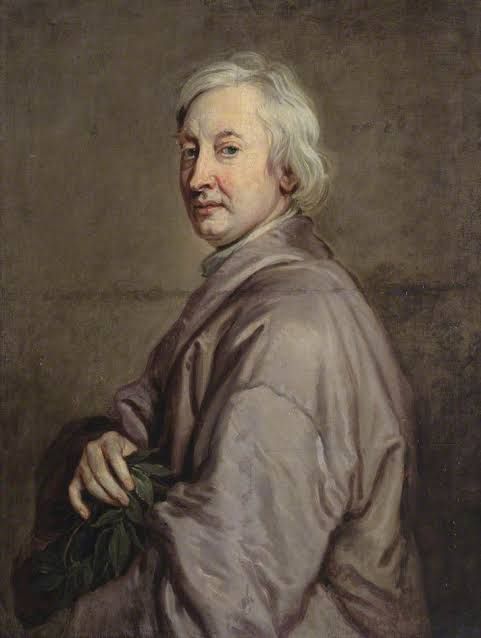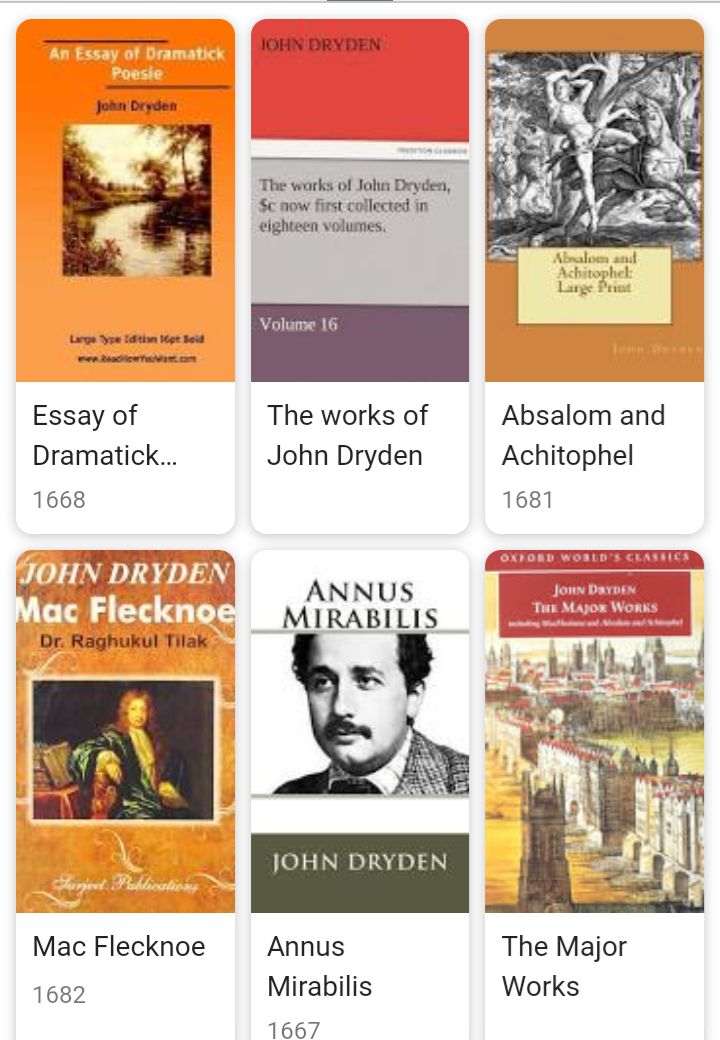John Dryden
Aug 28, 2019 • 164 views

His Life
Dryden was born near Oundle in Northamptonshire, and may have begun his education at Oundle Grama School. He later entered Westminster School and went on to Cambridge. In 1657 or 1658 he moved to London, where he remained for the rest of his life as a man of letters. His life was a long one. It was, in addition, an exceedingly fruitful one. For forty years he continued to produce an abundance of literary works of every kind-poems, plays, and prose works. The quality of it was almost unfailingly good, and at the end of his life his poetry was as fresh and vivacious as it had been in the prime of his manhood.
Of Dryden it can be said without qualification that he is representative of his age. Indeed, it has been urged as a fault against his character that he adapted himself with too facile a conscience to the changing fortunes of the times. His earliest work of any importance is pre-Restoration (1659), and consists of a laudation of the recently dead Oliver Cromwell. At the Restoration he changed views, attaching himself to the fortunes of Charles II and to the Church of England. This loyalty brought its rewards in honors and pensions, so that for many years Dryden was easily the most considerable literary figure in the land. Yet his career was not without its thorns, for smaller men were busy with their slanders. On the accession of James II in 1685 Dryden changed his faith and political persuasion, becoming a Roman Catholic. To his new beliefs he adhered steadfastly, even when in 1688 the Revolution brought certain disaster to such public men as adhered to Catholicism. Thus Dryden lost his posts of Poet Laureate and Historiographer Royal. The Laureateship was conferred on Shadwell his most rancorous foe; and Dryden retired with dignity to sustain his last years with his literary labours. To this last period of his career we owe some of his finest translations and narrative poems. When he died in 1700 he was accorded a splendid funeral in Westminster Abbey, though it was many years before his grave was marked by a tombstone.
His Works

His Poetry
Dryden began his life's work with poetry; he concluded it with poetry; and the years between are starred with the brightness of his greater poems. As early as February, 1664 Pepys records in his diary that he met "Mr Dryden, the poet"; and he remained "Mr Dryden, the poor" till the day of his death.It is therefore as a poet that Dryden is chiefly to be judged.
His first published poem of any consequence was a series of heroic stanzas on the death of the Protector Oliver Cromwell (1659). It consists of thirty-seven quatrains of no particular merit. They move stiffly, and are quite uninspired by any political or personal enthusiasm, but they are a striking manifestation of Dryden's directness, and show a certain angular force and some metrical dexterity.
In 1660 he made a great step forward in poetical craftsmanship by publishing Astræa Redux, in celebration of Charles II's return. The poem represents a complete reversal of the poet's political opinions, but it is nevertheless a noteworthy literary advance. In its handling of the subject it shows a firmer grip and stronger common sense; in its style a new command of sonorous and dignified phrasing; and (as important a feature as any of the others) it is written in the heroic couplet. His famous poetry is Mac Flecknoe, Annus Mirabilis etc.
His numerous prologues and epilogues, written in couplets, show abundant wit and vivacity, yet they habitually appeal to the worst instincts of his audiences, being very often coarse and unmannerly.
His Drama
In his dramatic work, as elsewhere, Dryden is a faithful reflex of his time. His methods and objects vary as the public appreciation of them waxes and wanes, with the result that he gives us a historical summary of the popular fancy.
His first play was a comedy, The Wild Gallant (1663), which had but a very modest success. It has the complicated plot of the popular Spanish comedies and the 'humours' of Jonson's. After this unsuccessful attempt at public favour Dryden turned to tragedy, which henceforth nearly monopolizes his dramatic work. His famous drama- All for Love, The Conquest of Granada etc.
His tragedies fall into two main groups:
(a) The Heroic Play. This is a new type of the tragedy that became prominent after the Restoration, and of which Dryden is one of the earliest and most skilful exponents. The chief features of the new growth are the choice of a great heroic figure for the central personage; a succession of stage incidents of an exalted character, which often, as Dryden himself realized, became ridiculous through their extravagance; a loud, declamatory style; and the rhymed couplet. Dryden's The Rival Ladies (1663) is a hybrid between the comic and heroic species of play; The Indian Emperor (1665). Tyrannick Love (1669), The Conquest of Granada (in two parts, 1669 and 1670), and Aureng-zebe (1675) show the heroic kind at its best and worst. Though Dryden is heavily weighted with the ponderous mechanism of the heroic play, his gigantic literary strength is often sufficient to give it an attraction and a kind of heavy-footed animation.
(b) His Blank-verse Tragedies. The heroic play was so easily parodied and made ridiculous that the wits of the Restoration were not slow to make a butt of it. Their onslaughts were not without theireffect on Dryden, for already in Aureng-zebe a weakening of the heroic mannerisms is apparent.
After the Revolution he wrote Don Sebastian (1690), Cleomene (1692), and Love Triumphant (1694). The last was a tragi-comedy and a failure. The other two, however, were quite up to the average of his plays. In addition, at various stages of his career he collaborated with Lee in two other tragedies, and attempted, with lamentable results, to improve upon Shakespeare's The Tempest and Troilus and Cressida.
His Prose
Dryden's versatility is apparent when we observe that in prose, as well as in poetry and drama, he attains to primacy in his generation. In the case of prose he has one rival, John Bunyan. No single item of Dryden's prose work is of very great length; but in his Essay of Dramatick Poesie (1668), in his numerous dedicatory epistles and prefaces, and in the scanty stock of his surviving letters we have a prose corpus of some magnitude. The general subject of his prose is literary criticism, and that of a sane and vigorous quality. The style is free, but not too free; there are slips of grammar, but they are not many. The Essay of Dramatick Poesie (1669) is his longest single prose work and a major piece of English literary criticism. It is in the form of a discussion between four characters, one of whom is Dryden himself, and treats, with an openness of mind and a lack of dogmatizing which are new in criticism, most of the major topics which interested contemporary dramatists. Among them were the question of rhyme or blank verse in drama; the comparison between French and English drama; and the possibility of making a judicious compromise between the strict observance of the classical unities and the greater freedom of the English dramatic tradition. Moreover, the essay is the first attempt to evaluate the work of the Elizabethan dramatists and especially of Shakespeare.
